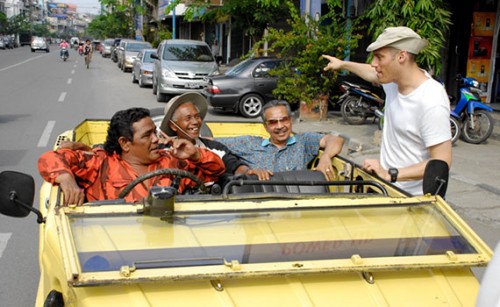When Joshua Oppenheimer, the director of The Act of Killing, spoke in Golden Auditorium last Friday, he described his Oscar-nominated film as a tightrope between empathy and repulsion.
The documentary — which was shown before Oppenheimer’s talk — tells the story of the 1965 genocide in Indonesia from the perspective of the perpetrators. It examines and seeks to expose the act itself, the mindset of the perpetrators, and the filmmaking process.
“The past … structures the stories we share in the present and haunts,” said Oppenheimer, who came to Colgate from Copenhagen, Denmark.
The Act of Killing attempts to shed light on one of the darkest chapters in human history as well as the costs of an inability to control greed and hunger for power. “This is not a story only about Indonesia — it is a story about us all,” Oppenheimer said in his director’s statement.
Because the killers take ownership of creating a movie within the larger documentary, it “creates a sort of fever dream in which we are lost and then get spit back out into the real world at the end,” he said.
Although The Act of Killing lost out on this year’s Oscar for best documentary, it received the 2013 European Film Award for Best Documentary and the 2013 Asia Pacific Screen Award, among others.
Oppenheimer’s visit featured two receptions where students and professors met the director and asked questions. He also clarified moments in the film and explained the filmmaking process during a panel discussion with professors Penny Lane and Emilio Spadola.
Lane, an art and art history professor who helped to bring Oppenheimer to campus, reflected: “Being in that space of horror and humor and surrealism and fear and confusion, and then having a chance to hear Joshua describe the conditions under which the film was made, the intentions behind it, and its real and undeniable effect in the world — that whole experience was life-changing for me.”
She first saw the documentary at the 2013 South By Southwest film festival, where Lane was premiering her own award-winning documentary, Our Nixon. “I immediately knew I wanted to bring it to Colgate to serve as a springboard for many discussions at and beyond [the university],” she said.
Lane’s hopes became a reality — The Act of Killing became a discussion point in film and media studies, CORE, and peace and conflict studies classes.
The event, which was part of the Friday Night Film Series, was sponsored by the Colgate Arts Council.

